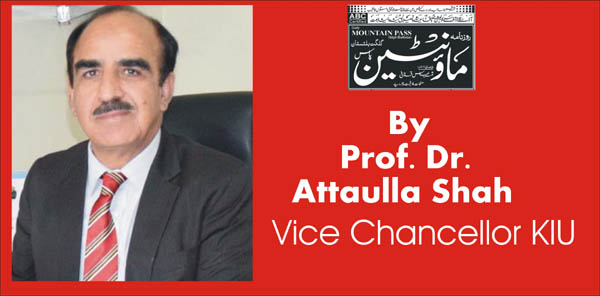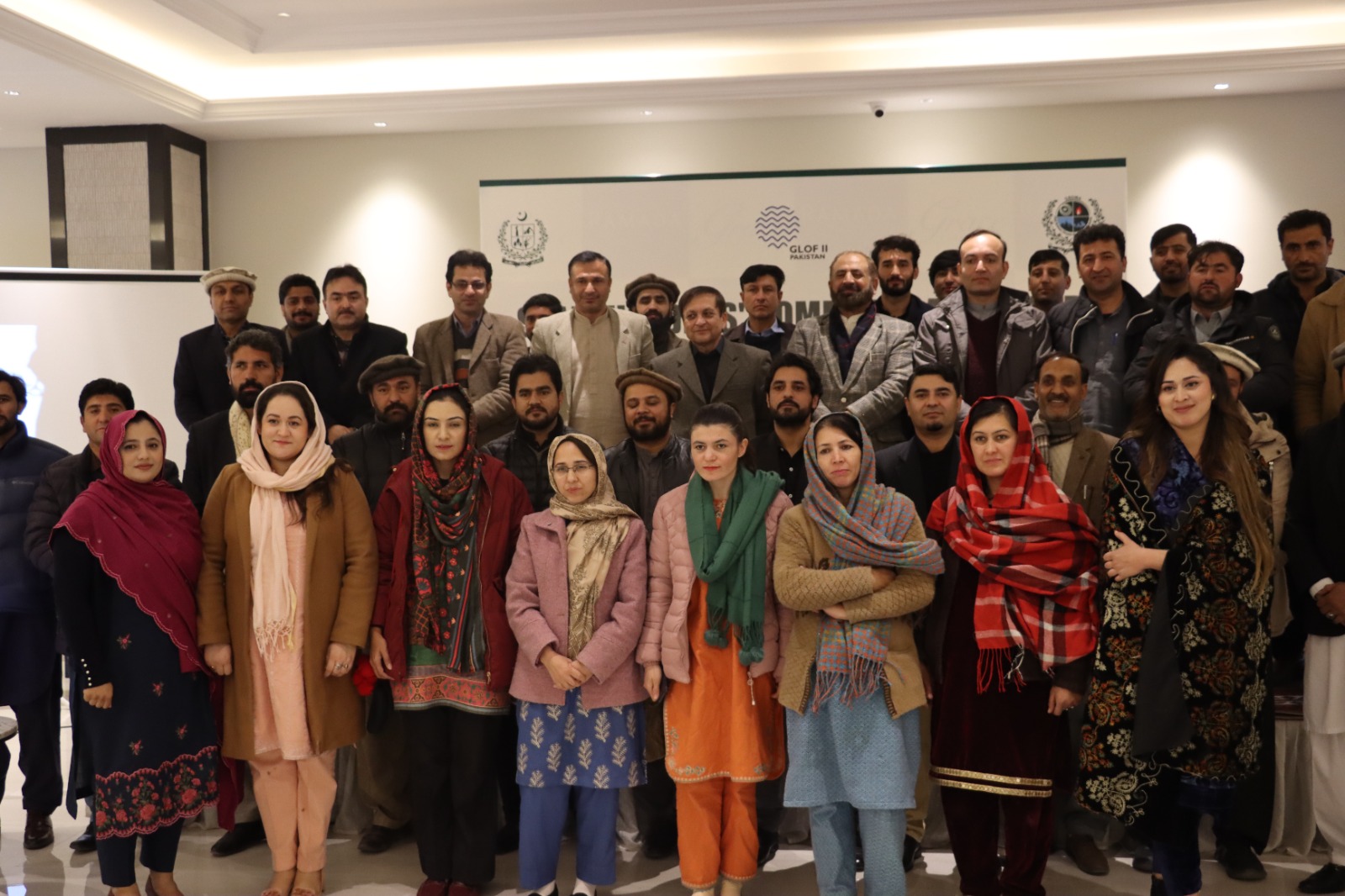By Prof. Dr. Attaulla Shah, Vice Chancellor KIU
Karakorum International University (KIU) was established as ray of hope for the people of Gilgit Baltistan (GB), to provide opportunities of higher education and research for the people of this mountain society with unique attributes and culture. KIU has been delivering its role in a befitting manner as more than 5000 students have so far graduated from this unique institution of Pakistan and an equal number is currently enrolled. In this article, the KIU present challenges and future role will be discussed.
The first and foremost challenge before all Universities and Higher Education Institutes (HEIs) is to achieve the high standards and quality in its education and research. The Total Quality Management (TQM) requires that quality must be part of the culture of an organization and it must be reflected in all processes, procedures, products and services. The degrees awarded to the graduates must carry the requisite quality of Knowledge, Skills and Attitudes (KSA) expected from them by the job market and society. For instance, a civil Engineering graduates is always expected to exhibit some fundamental Engineering knowledge, practical skills like critical & analytical thinking, use of modern tools and anticipated attitudes of teamwork, interpersonal communication and commitment. That’s why that the Engineering Education in Pakistan has been transforming to Outcome Based Education (OBE) under the Washington Accord. Pakistan Engineering Council (PEC) is actively pursuing the agenda of OBE rationale in all the accredited institutions.
At present, there are various Universities Ranking Systems at global levels. The most commonly used ranking system is Academic Ranking of World Universities (ARWU), which is also called Shanghai Ranking, followed by QS Universities Ranking, Multi U Ranking System. The global Universities Ranking system generally based quality education, research, international standing, the role and contributions of their graduates in the job market, research productivity and new businesses & Startups. Keeping these attributes in mind, Higher Education Pakistan also introduced National Universities Ranking System which remained in-vogue for many years. This system was also based on Quality Assurance system of University, Research productivity and Governance structure of Universities. HEC deferred this system since last two years. Though there were some inherent weaknesses in the HEC ranking system and it could have been improved yet it provided a tool for quality self-assessment and Continuous Quality Improvement (CQI). Many developing countries around the world have developed their indigenous Universities Ranking System. The Quality Assurance Agency (QAA) of Higher Education Commission (HEC), has developed Quality Enhancement Cells (QECs) at all Universities, which have been bestowed with the responsibilities of ensuring of quality of education and research at Universities. The QAA and QEC have effectively contributed to promotion of quality culture in Universities. The efforts of QAA, are however mostly focused on the macro level quality attributes of Universities and the QEC is expected to follow the guidelines and regulations provided by the QAA. Over the years, it has been observed that the efforts of QAA and QEC have not been more focused on the micro level quality assurance which is the spirit of TQM.
The Quality Enhancement Cells at Universities also need revamping as it must be based on the fundamental principles comprising of three major processes of Quality Planning, Quality Assurance and Quality Controlling. Quality planning is its most important part, which establishes the basic principles of standards for all processes and procedures. The basic standards and specification, the attributes of quality assurance and quality control system and the roles as well the reporting systems in Universities must be spelled out in detailed. To this end, HEC has also provided some basic principles and guidelines. However Universities can further strengthened their quality system, by framing their own rules. The QEC must develop their Quality Manual indicating the fundamental principles and standards for quality. The next important step is deploy the processes to assure that the quality standards established for various processes and procedures have been achieved at the desired level of performance. Through Universities in general have well-articulated Quality Plans, but their implementation is always a challenge. This requires training and capacity building of all staff, deploying the system to monitor the performance of various sections & departments and finally having a technology based monitoring for quality assurance system which can include assessment and reporting system on real time basis. The final component of TQM system is quality control which is more important as takes appropriate corrective actions, in case there is any deviation from the established quality standards. The QEC has to suggest timely, reliable and consistent corrective and preventive measures. It must also establish an accountability system for quality control. To promote the quality culture in Universities, the following recommendations have been made:
– Strengthening the QECs in Universities in terms of their qualified staff, capacity building of staff and empowerment in the major decisions. HEC has already obliged the Universities to include QEC in all important statutory bodies and committees.
– Capacity building of the faculty and staff as well students to understand various processes and procedures about the quality assurance and quality control.
– Deploying of TQM processes with the help of technology driven Campus Quality Management and Information System as part of the Campus Management System.
– Motivating the Universities to adopt the international quality standards. There can be some additional funding for such Universities, having the quality premium.
– Improving the University governance system by giving clear roles, responsibilities and accountabilities to various stakeholders in achieving the quality and standards.
The number of Universities in Pakistan has increased from around 50 to about 180 in last 15 years since the inception of Higher Education Commission (HEC), as an offshoot of former University Grants Commission (UGC). The transformation has increased the enrolment of students in higher education, research productivity, access of affordable quality higher education to the remote areas of the country, manifold. However the global recognition of the Higher Education institutes of Pakistan would still take long time. At present very few HEIs of Pakistan have qualified in the top 500 World Universities. For HEC, it is not possible to involve in micro level quality assurance at the Universities. In this context, HEC has established fundamental principles, rules, regulations, standard curriculum and other related acceptable standards. In addition to these initiatives, about 15 accreditation councils have also been established which include Pakistan Engineering Council (PEC), Pakistan Medical & Dental Council (PMDC), Pakistan Council of Architects and Town Planners (PCATP), National Technology Council (NTC), National Council of Accreditation for Computer Education (NCACE), National Accreditation Council for Teacher Education (NACTE), National Business Education Accreditation Council (NBEAC), etc. These councils are generally regulating the BS (undergraduate programs) on the compliance of Higher Education Institutes in the areas of Programs’ objectives, Faculty, staff, curriculum, facilities, research publications, library and Lab resources, finances, program quality assurance and review systems etc. These councils are represented by senior professional and experts of the relevant fields from both academia and industry. Despite of all these interventions by HEC, the journey of quality education compatible to the international standards is still, a long journey.
The quality assurance of graduate programs (MS/PhD) is even a bigger challenge as it requires appropriate research infrastructure including highly qualified PhD faculty, dynamic curriculum, society focused research, publishing the research outcomes in the international renowned journals and patenting the research outcomes. To achieve the acceptable standards of graduate programs, HEC also initiated the review process of MS & PhD program for the programs initiated after 2013. This review process has been mainly focused on the following aspects of the programs;
– Admission and Entrance system
– Minimum eligibility for the admission to the graduate program
– Curriculum in terms of core and elective courses with the details of topics etc.
– Teaching faculty, their qualification and experience and relevance to the programs.
– Assessment system for the semester teaching and its linking to the program objectives,
– Internal monitoring and governance system for the quality assurance of graduate programs
– Research outcomes and publications of the graduate programs
Under this peer review system of graduate programs by HEC, a large number of graduates programs have been reviewed across the Universities. HEC as a result have halted, discontinued or stopped further admissions in graduate programs, where the established HEC standards have been compromised. With these decisions, numerous students already enrolled in these programs have suffered as some of them were in the research phases, however the onus mainly lies on the institutions and not HEC.
For achieving the targets of quality in higher education and research is not possible with these initiatives of HEC alone and rather the HEIs would need to bring an Integrate Quality Improvement System (IQIS). At Karakorum University, we have revamped the QEC on the following basic inputs:
– Quality is a journey and not destination and HEIs have to develop as part of their culture rather quality culture. To this end, effective rigorous training of the staff and faculty is pre-requisite. The Human Development Centre (HRDC) at KIU has been reorganized with the target to develop the capacity of all staff through continuous trainings. A training calendar has been devised for all faculty and staff and it has been made mandatory for all staff to undergo at least one training in each semester. This will make KIU as a learning organization in times to come.
– To strengthen the quality assurance and quality control systems. This system will be comprised of establishing the standards of quality teaching and research based on approved HEC guidelines, national and international good practices. These standards will be documented in the form of quality manual, which will be widely disseminated to all the stakeholders. This will be followed by quality assurance to make sure that the standards envisaged in the plan have been achieved. The quality assurance in terms of curriculum design, development, delivery, assessment needs to be reviewed throughout the semester. For this purpose, Online Learning Management System (LMS) is being deployed. The next step is quality control, where required timely and effective corrective actions will be taken. For this purpose, a board based Teaching and Research Review Committee comprising of Deans, HoD, Dir QEC etc. has been constituted.
– For enhancing the capacity building of students and improving the attributes of knowledge, Skills and Attitude, an effective Students’ Counseling and Career Development System is always required. An Integrated Students Counseling System (ISCS) is also developed to emphasize over their counseling, career development, mentoring, internships and placements. Online Students’ Performance Review Dashboard is being designed to regularly monitor their academic and co-curricular development and where required provide timely counseling.
Quality is only way to survive for all organization profit or non for profit. To ensure that the systems deployed, the human resources and graduates produced have the desired level of quality, everyone in HEIs have to really work hard. At Universities, we are receiving mainly poor intake of students and to make them at par with national best, we have to really work very hard.
 Daily Mountain Gilgit Baltistan News Website News website of Daily Mountain Gilgit Baltistan
Daily Mountain Gilgit Baltistan News Website News website of Daily Mountain Gilgit Baltistan




